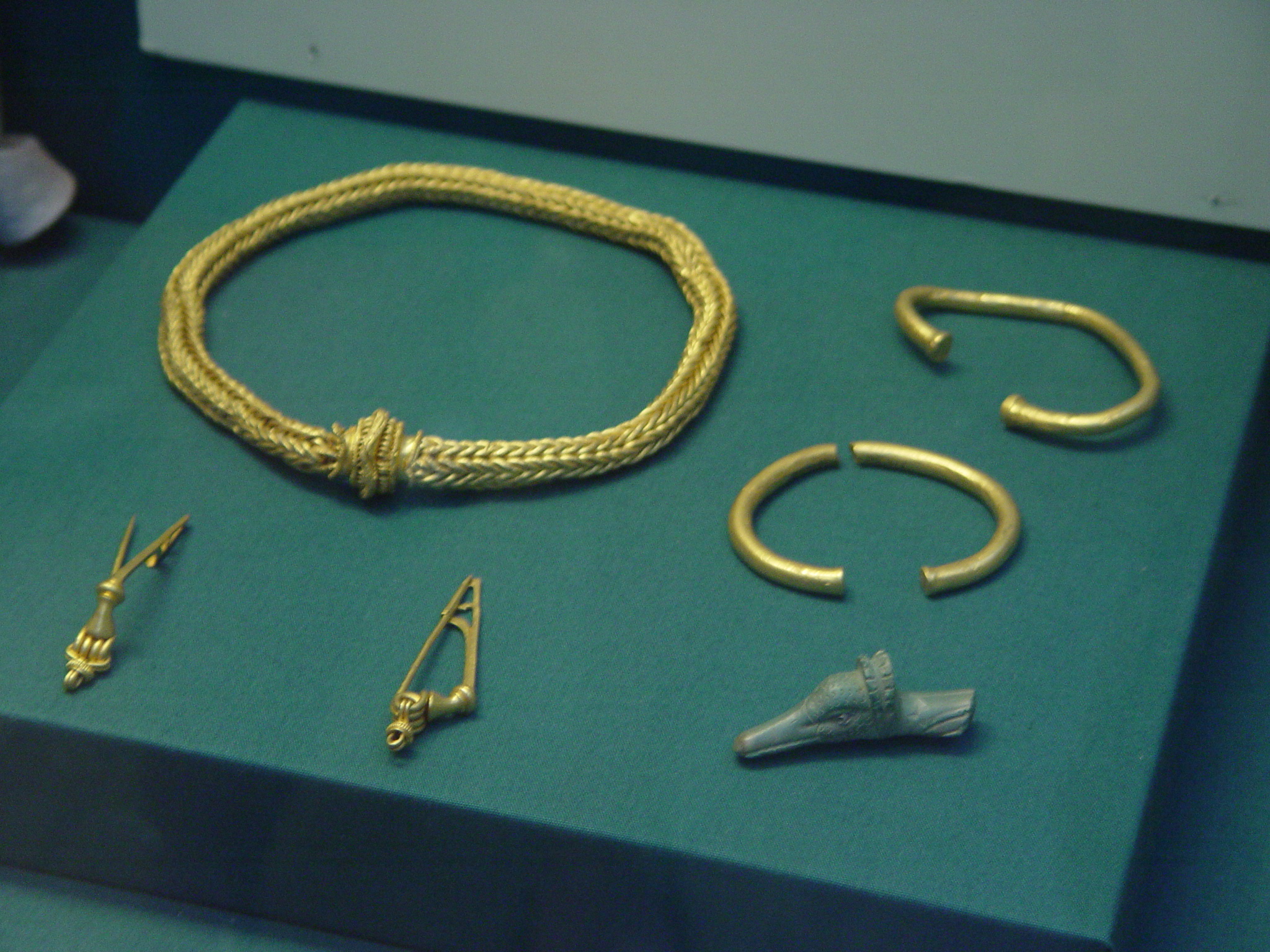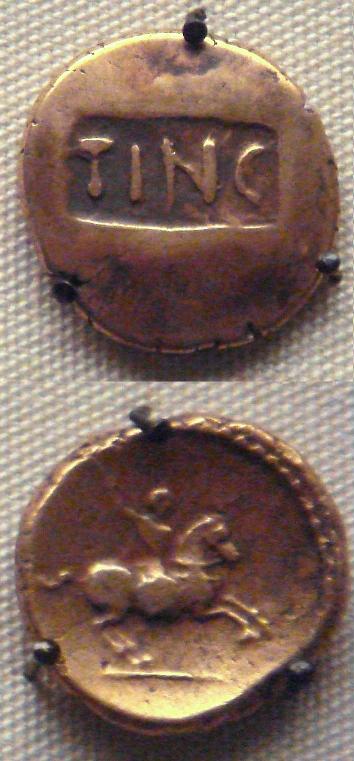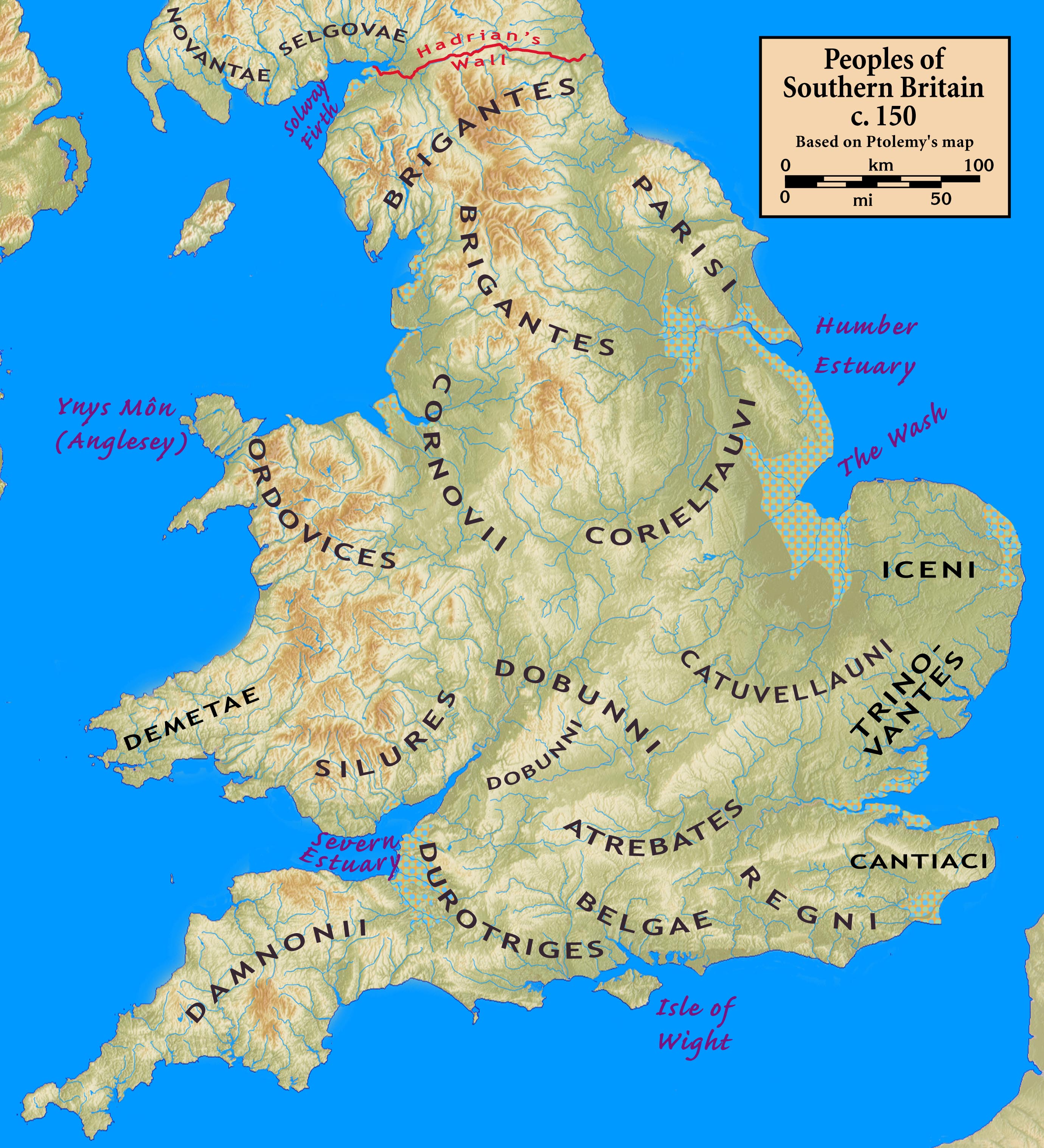|
Commius
Commius (Commios, Comius, Comnios) was a king of the Belgic nation of the Atrebates, initially in Gaul, then in Britain, in the 1st century BC. Ally of Caesar When Julius Caesar conquered the Atrebates in Gaul in 57 BC, as recounted in his ''Commentarii de Bello Gallico'', he appointed Commius as king of the tribe. Before Caesar's first expedition to Britain in 55 BC, Commius was sent as Caesar's envoy to persuade the Britons not to resist him, as Caesar believed he would have influence on the island. However he was arrested as soon as he arrived. When the Britons failed to prevent Caesar from landing, Commius was handed over as part of the negotiations. Commius was able to provide a small detachment of cavalry from his tribe to help Caesar defeat further British attacks. During Caesar's second expedition to Britain Commius negotiated the surrender of the British leader Cassivellaunus. He remained Caesar's loyal client through the Gaulish revolts of 54 BC, and in return Caesar ... [...More Info...] [...Related Items...] OR: [Wikipedia] [Google] [Baidu] |
Atrebates
The Atrebates (Gaulish: *''Atrebatis'', 'dwellers, land-owners, possessors of the soil') were a Belgic tribe of the Iron Age and the Roman period, originally dwelling in the Artois region. After the tribes of Gallia Belgica were defeated by Caesar in 57 BC, 4,000 Atrebates participated in the Battle of Alesia in 53, led by their chief Commius. They revolted again in 51 BC, after which they maintained a friendly relationship with Rome, as Commius received sovereignty over the neighbouring Morini. The quality of their woollens is still mentioned in 301 AD by Diocletian's Price Edict. An offshoot of the Belgic tribe probably entered Britain before 54 BC, where it was successively ruled by kings Commius, Tincommius, Eppillus and Verica. After 43 AD, only parts of the area were still controlled by king Claudius Cogidubnus, after which they fell under Roman power. Name They are mentioned as ''Atrebates'' by Caesar (mid-1st c. BC) and Pliny (1st c. AD), ''Atrebátioi'' (Ἀ� ... [...More Info...] [...Related Items...] OR: [Wikipedia] [Google] [Baidu] |
Eppillus
Eppillus (Celtic: "little horse") was the name of a Roman client king of the Atrebates tribe of the British Iron Age. He appears to have ruled part of the territory that had previously been held by Commius, the Gaulish former ally of Julius Caesar who fled to Britain following the uprising of Vercingetorix, or possibly of his son. Eppillus is not mentioned in any historical sources. Coins bearing his name also bear the inscription COMMI.FILI which is generally read as ''Commios filius'' indicating at least a claim to be Commius's son. After Commius's death in about 20 BC, based on numismatic evidence, Eppillus seems to have ruled jointly with another ruler named Tincomarus. The COMMI.FILI inscription also appears on Tincomarus's coins suggesting they could have been brothers. Eppillus's capital was Noviomagus Reginorum (Chichester) in the south of the kingdom, while Tincomarus ruled from Calleva Atrebatum ( Silchester) in the north. Eppillus became ruler of the whole territory ... [...More Info...] [...Related Items...] OR: [Wikipedia] [Google] [Baidu] |
Gaius Volusenus
Gaius Volusenus Quadratus (''fl.'' mid-1st century BC) was a distinguished military officer of the Roman Republic. He served under Julius Caesar for ten years, during the Gallic Wars and the civil war of the 40s. Caesar praised him for his strategic sense and courageous integrity. Italian origin The name Volusenus may be Etruscan in origin (as ''Volasenna''), but some scholars have attributed an Umbrian origin to the family, based on inscriptional evidence. Military service During the Gallic War Volusenus served as ''tribunus militum'' in the 12th Legion under the ''legatus legionis'' Servius Galba, and distinguished himself in battle when Galba was defeated by the Nantuates in 57 BC. In 55 BC Volusenus was sent out by Caesar in a single warship to undertake a week-long survey of the coast of south eastern Britain prior to Caesar's invasion. He probably examined the Kent coast between Hythe and Sandwich. However, when Caesar arrived at Dover with his forces he saw that la ... [...More Info...] [...Related Items...] OR: [Wikipedia] [Google] [Baidu] |
Tincomarus
Tincomarus (a dithematic name form typical of insular and continental Celtic onomastics, analysable as ''tinco-'', perhaps a sort of fish f Latin ''tinca'', English ''tench''+ ''maro-'', "big") was a king of the Iron Age Belgic tribe of the Atrebates who lived in southern central Britain shortly before the Roman invasion. His name was previously reconstructed as Tincommius, based on abbreviated coin legends and a damaged mention in Augustus's '' Res Gestae'', but since 1996 coins have been discovered which give his full name. He was the son and heir of Commius and succeeded his father around 25-20 BC. Based on coin distribution it is possible that Tincomarus ruled in collaboration with his father for the last few years of Commius's life. Little is known of his reign although numismatic evidence suggests that he was more sympathetic to Rome than his father was in later years: the coins he issued much more closely resemble Roman types, and are made in such a way they may have come ... [...More Info...] [...Related Items...] OR: [Wikipedia] [Google] [Baidu] |
Roman Client Kingdoms In Britain
The Roman client kingdoms in Britain were native tribes which chose to align themselves with the Roman Empire because they saw it as the best option for self-preservation or for protection from other hostile tribes. Alternatively, the Romans created (or enlisted) some client kingdoms when they felt influence without direct rule was desirable. Client kingdoms were ruled by client kings. In Latin these kings were referred to as ''rex sociusque et amicus'', which translates to "king, ally, and friend". The type of relationships between client kingdoms and Rome was reliant on the individual circumstances in each kingdom. The beginnings of the system are to be found in Caesar's re-enthroning of Mandubracius as king of the Trinovantes, who had been dethroned by Cassivellaunus and then aided Caesar's second invasion of Britain in 54 BC. The system further developed in the following hundred years, particularly under Augustus's influence, so that by the time of the Roman invasion in ... [...More Info...] [...Related Items...] OR: [Wikipedia] [Google] [Baidu] |
Verica
Verica (early 1st century AD) was a British client king of the Roman Empire in the years preceding the Claudian invasion of 43 AD. From his coinage, he appears to have been king of the probably Belgic Atrebates tribe and a son of Commius. The distribution of his coins also shows that Verica's kingdom was centred on modern Sussex and east Hampshire, and its capital would have been in or close to what became the Roman Noviomagus Reginorum (modern Chichester). He succeeded his elder brother Eppillus as king in about 15 AD, and may also have reigned over the northern Atrebatic kingdom at Calleva Atrebatum, today called Silchester. He was recognised as '' rex'' by Rome and appears to have had friendly trade and diplomatic links with the empire. His territory was pressed from the east by the Catuvellauni, led by Epaticcus, brother of Cunobelinus, who conquered Calleva in about 25 AD. After Epaticcus's death ca. 35 AD Verica regained some territory, but Cunobelinus's son Carat ... [...More Info...] [...Related Items...] OR: [Wikipedia] [Google] [Baidu] |
Cassivellaunus
Cassivellaunus was a historical British military leader who led the defence against Julius Caesar's second expedition to Britain in 54 BC. He led an alliance of tribes against Roman forces, but eventually surrendered after his location was revealed to Julius Caesar by defeated Britons. Cassivellaunus made an impact on the British consciousness. He appears in British legend as Cassibelanus, one of Geoffrey of Monmouth's kings of the Britons, and in the ''Mabinogi'', ''Brut y Brenhinedd'' and the Welsh Triads as Caswallawn, son of Beli Mawr. Name The Common Brittonic personal name ''Cassiuellaunos'' stems from the word ''uellaunos'' ('chief, commandant'). The meaning of the prefix ''cassi-'' has been debated, but it possibly signifies 'tin, bronze'. Cassivellaunus may thus been translated as 'Chief-of-Tin', that is to say 'the inflexible'. The personal name ''Ver-cassivellaunus'' ('True-Chief-of-Tin') is related. History Cassivellaunus appears in Julius Caesar's ''Commentar ... [...More Info...] [...Related Items...] OR: [Wikipedia] [Google] [Baidu] |
Morini
The Morini (Gaulish language, Gaulish: 'sea folk, sailors') were a Belgae, Belgic coastal tribe dwelling in the modern Pas-de-Calais, Pas de Calais region, around present-day Boulogne-sur-Mer, during the La Tène culture, Iron Age and the Roman period. Name They are mentioned as ''Morini'' by Julius Caesar, Caesar (mid-1st c. BC) and Pliny the Elder, Pliny (1st c. AD), ''Morinoì'' (Μορινοὶ) by Strabo (early 1st c. AD), ''Morinos'' by Pomponius Mela (mid-1st c. AD) and Tacitus (early 2nd c. AD), ''Morinō̃n'' (Μορινω̃ν) by Ptolemy (2nd c. AD), ''Mōrínous'' (Μωρίνους; acc.) by Cassius Dio (3rd c. AD), and as ''Morinorum'' (gen.) in the ''Notitia Dignitatum'' (5th c. AD). The Gaulish language, Gaulish ethnonym ''Morini'' (sing. ''Morinos'') literally means 'those of the sea', that is to say the 'sea folk' or the 'sailors'. It stems from Proto-Celtic language, Proto-Celtic ''*mori'' ('sea'; cf. Old Irish ''muir'', Middle Welsh ''mor'' 'sea'), itself from ... [...More Info...] [...Related Items...] OR: [Wikipedia] [Google] [Baidu] |
Siege Of Alesia
The Battle of Alesia or siege of Alesia (September 52 BC) was the climactic military engagement of the Gallic Wars, fought around the Gallic ''oppidum'' (fortified settlement) of Alesia in modern France, a major centre of the Mandubii tribe. It was fought by the Roman army of Julius Caesar against a confederation of Gallic tribes united under the leadership of Vercingetorix of the Arverni. It was the last major engagement between Gauls and Romans, and is considered one of Caesar's greatest military achievements and a classic example of siege warfare and investment; the Roman army built dual lines of fortifications—an inner wall to keep the besieged Gauls in, and an outer wall to keep the Gallic relief force out. The Battle of Alesia marked the end of Gallic independence in the modern day territory of France and Belgium. The battle site was probably atop Mont Auxois, above modern Alise-Sainte-Reine in France, but this location, some have argued, does not fit Caesar's des ... [...More Info...] [...Related Items...] OR: [Wikipedia] [Google] [Baidu] |
Belgae
The Belgae ( , ) were a large confederation of tribes living in northern Gaul, between the English Channel, the west bank of the Rhine, and the northern bank of the river Seine, from at least the third century BC. They were discussed in depth by Julius Caesar in his Commentarii de Bello Gallico, account of his wars in Gaul. Some peoples in southern Roman Britain, Britain were also called Belgae and had apparently moved from the continent. T. F. O'Rahilly believed that some had moved further west and he equated them with the Fir Bolg in Ireland. The Roman province of Gallia Belgica was named after the continental Belgae. The term continued to be used in the region until the present day and is reflected in the name of the modern country of Belgium. Etymology The consensus among linguists is that the ethnic name ''Belgae'' probably comes from the Proto-Celtic root ''*belg-'' or ''*bolg-'' meaning "to swell (particularly with anger/battle fury/etc.)", cognate with the Dutch language ... [...More Info...] [...Related Items...] OR: [Wikipedia] [Google] [Baidu] |
Winchester Hoard
The Winchester Hoard is a hoard of Iron Age gold found in a field in the Winchester area of Hampshire, England, in 2000, by a retired florist and amateur metal detectorist, Kevan Halls. It was declared treasure and valued at £350,000—the highest reward granted under the Treasure Act 1996 at that time. The hoard consists of two sets of jewellery of a very high purity of gold dating from 75 to 25 BCE. Although, the items pre-date the Roman conquest of Britain in 43 CE, the manufacturing technology was Roman rather than Celtic. The total weight of the items is nearly . The find was described as "the most important discovery of Iron Age gold objects" for fifty years; and the items were probably an "expensive", " diplomatic gift". The brooches alone were "the third discovery of its kind from Britain". The Winchester Hoard is now housed at the British Museum in London. Discovery and valuation The hoard was discovered near Winchester over a series of trips to a farmer's plo ... [...More Info...] [...Related Items...] OR: [Wikipedia] [Google] [Baidu] |
Titus Labienus
Titus Labienus (17 March 45 BC) was a high-ranking military officer in the late Roman Republic. He served as tribune of the Plebs in 63 BC. Although mostly remembered as one of Julius Caesar's best lieutenants in Gaul and mentioned frequently in the accounts of his military campaigns, Labienus chose to oppose him during the Civil War and was killed at Munda. He was the father of Quintus Labienus. Biography Early career As his praetorship was in 60 or 59 BC, Titus Labienus most likely was born around 100 BC.Tyrrell (3) Many sources suggest that he came from the town of Cingulum in Picenum. His family was of equestrian status. He most likely had early ties with Pompey during his time as a patron for Picenum and his desire to rise in military rank. His early service was c. 78–75 BC in Cilicia under Publius Servilius Vatia Isauricus fighting pirates and the Isaurian hill tribes. Tribune of the Plebs, Trial of Gaius Rabirius In 63 BC, Titus Labienus was a tribune of the Ple ... [...More Info...] [...Related Items...] OR: [Wikipedia] [Google] [Baidu] |







